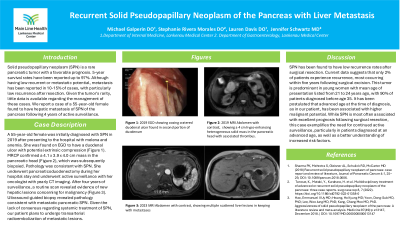Sunday Poster Session
Category: Biliary/Pancreas
P0129 - Recurrent Solid Pseudopapillary Neoplasm of the Pancreas With Liver Metastasis
Sunday, October 27, 2024
3:30 PM - 7:00 PM ET
Location: Exhibit Hall E

Has Audio
- MG
Michael Galperin, DO
Lankenau Medical Center
Wynnewood, PA
Presenting Author(s)
Michael Galperin, DO, Lauren Davis, DO, Stephanie Rivera Morales, MD, Jennifer Schwartz, DO
Lankenau Medical Center, Wynnewood, PA
Introduction: Solid pseudopapillary neoplasm (SPN) of the pancreas is a rare tumor composing 0.13 to 2.7% of all pancreatic tumors and has a young female predominance with a favorable prognosis. 5-year survival rates have been reported up to 97%. Although this tumor has been found to have a low recurrent or metastatic potential, metastasis has been reported in up to 10-15% of cases. However, the recurrence rate after resection remains relatively low. Given the rarity of the tumor, little data is available regarding the management of these cases. We report a case of a 55-year-old female found to have hepatic metastasis of SPN of the pancreas following 4-years of active surveillance.
Case Description/Methods: Our patient, a 55-year-old female, was initially diagnosed with solid pseudopapillary neoplasm of the pancreas in 2019 after presenting to the hospital with melena and anemia as an outpatient. Upper endoscopy revealed evidence of a duodenal ulcer with potential extrinsic compression. Further imaging revealed a 4.5 x 5 cm mass in the pancreaticoduodenal groove, confirmed on MRCP. The lesion was biopsied, and pathology was consistent with SPN. The patient underwent pancreaticoduodenectomy during her hospital stay and was subsequently undergoing active surveillance with her oncologist with yearly CT imaging. After four years of surveillance, a routine scan revealed evidence of new hepatic lesions concerning for malignancy. Ultrasound-guided biopsy revealed pathology consistent with metastatic pancreatic SPN. Given the lack of consensus regarding systemic treatment of SPN, our patient plans to undergo transarterial radioembolization of metastatic lesions in the near future.
Discussion: Solid pseudopapillary neoplasm of the pancreas has been found to have low recurrence rates after surgical resection. Current data suggests that only 2% of patients experience recurrence, the majority being within 5 years following surgical excision. This tumor is predominant in young women, with the mean age of presentation listed from 21 to 24 years old, with 90% of patients diagnosed prior to age 35. It has been postulated that advanced age at the time of diagnosis, as in our patient, has been associated with higher malignant potential. While SPN is most often associated with excellent prognosis following surgical resection, this case exemplifies the need for continued active surveillance, particularly in patients diagnosed at an advanced age, as well as a better understanding of increased risk factors.
Disclosures:
Michael Galperin, DO, Lauren Davis, DO, Stephanie Rivera Morales, MD, Jennifer Schwartz, DO. P0129 - Recurrent Solid Pseudopapillary Neoplasm of the Pancreas With Liver Metastasis, ACG 2024 Annual Scientific Meeting Abstracts. Philadelphia, PA: American College of Gastroenterology.
Lankenau Medical Center, Wynnewood, PA
Introduction: Solid pseudopapillary neoplasm (SPN) of the pancreas is a rare tumor composing 0.13 to 2.7% of all pancreatic tumors and has a young female predominance with a favorable prognosis. 5-year survival rates have been reported up to 97%. Although this tumor has been found to have a low recurrent or metastatic potential, metastasis has been reported in up to 10-15% of cases. However, the recurrence rate after resection remains relatively low. Given the rarity of the tumor, little data is available regarding the management of these cases. We report a case of a 55-year-old female found to have hepatic metastasis of SPN of the pancreas following 4-years of active surveillance.
Case Description/Methods: Our patient, a 55-year-old female, was initially diagnosed with solid pseudopapillary neoplasm of the pancreas in 2019 after presenting to the hospital with melena and anemia as an outpatient. Upper endoscopy revealed evidence of a duodenal ulcer with potential extrinsic compression. Further imaging revealed a 4.5 x 5 cm mass in the pancreaticoduodenal groove, confirmed on MRCP. The lesion was biopsied, and pathology was consistent with SPN. The patient underwent pancreaticoduodenectomy during her hospital stay and was subsequently undergoing active surveillance with her oncologist with yearly CT imaging. After four years of surveillance, a routine scan revealed evidence of new hepatic lesions concerning for malignancy. Ultrasound-guided biopsy revealed pathology consistent with metastatic pancreatic SPN. Given the lack of consensus regarding systemic treatment of SPN, our patient plans to undergo transarterial radioembolization of metastatic lesions in the near future.
Discussion: Solid pseudopapillary neoplasm of the pancreas has been found to have low recurrence rates after surgical resection. Current data suggests that only 2% of patients experience recurrence, the majority being within 5 years following surgical excision. This tumor is predominant in young women, with the mean age of presentation listed from 21 to 24 years old, with 90% of patients diagnosed prior to age 35. It has been postulated that advanced age at the time of diagnosis, as in our patient, has been associated with higher malignant potential. While SPN is most often associated with excellent prognosis following surgical resection, this case exemplifies the need for continued active surveillance, particularly in patients diagnosed at an advanced age, as well as a better understanding of increased risk factors.
Disclosures:
Michael Galperin indicated no relevant financial relationships.
Lauren Davis indicated no relevant financial relationships.
Stephanie Rivera Morales indicated no relevant financial relationships.
Jennifer Schwartz indicated no relevant financial relationships.
Michael Galperin, DO, Lauren Davis, DO, Stephanie Rivera Morales, MD, Jennifer Schwartz, DO. P0129 - Recurrent Solid Pseudopapillary Neoplasm of the Pancreas With Liver Metastasis, ACG 2024 Annual Scientific Meeting Abstracts. Philadelphia, PA: American College of Gastroenterology.
